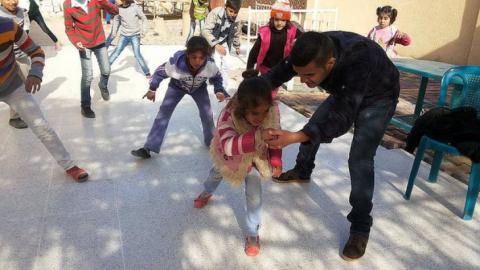In 2009, a group of young people visited the al-Tanf refugee camp, located on the Syria-Iraq border, to train children in the art of Capoeira, which combines elements of sport, dance and music. Its healing effects amazed both their families and the trainers. When the team left, two weeks later, they heard the kids chant: "Bidna Capoeira! Bidna Capoeira!" ("We want Capoeira" in Arabic).
"The message was pretty clear. The children in the camp gave us a name, and a source of inspiration," Syrian-German Tarek, co-founder of Bidna Capoeira, said in an interview with Syria Untold.
Commonly referred to as a "no-man’s land," al-Tanf housed, since 2006, some 850 Palestinian refugees who had fled sectarian strife in Iraq. Many of them were children. Refused entry to Syria, they were trapped in a desolate place between the borders for over four years.
The introduction of Capoeira in the camp promoted physical activity and contributed to psychological stabilization. “Capoeira was central to the dynamic of the camp and was important to the morale of the people there,” Ms. Boualia, Head of Mission UNICEF Syria, said. “Though al-Tanf has now been closed, other problems remain, and Capoeira will likely play a part in alleviating the boredom of refugee children in the future.”
https://www.youtube.com/watch?v=rcufC52pFng
Since then, Bidna Capoeira has gone a long way. In January 2010, the team established itself in Syria as an international NGO, formed by Syrians in cooperation with some international trainers. They worked with Syrians, and with Palestinian and Iraqi refugee communities, focusing on children and people who suffered post-traumatic stress and in risk of exclusion. The effects were visible, and measurable, as the reports from the psychologists accompanying Bidna Capoeira prove.
"I have already witnessed numerous times that Capoeira has a magical effect on children and whole communities especially when they are living in such vulnerable circumstances," Tarek explained. "For children, it is the highlight of their week, or month. I remember Umaima, who was so happy after training that her mother kept asking us: ‘What kind of magic do you use, that makes the minds of our kids free?’"
Like everyone working in Syria, the team suffered the corruption and nepotism that impregnated every sphere of the country. "Without knowing the ‘right’ people and creating and maintaining the ‘right’ relationships one could not get anything done, least of all introduce a foreign activity into the country," Tarek recalled. "The infrastructure and business culture of Syria also made implementing projects challenging. The Syrian Sport Federation, the governing body for sports, was corrupt and unprofessional. Internet was slow, you needed proxies for social media, there were constant electricity cuts..."
"And there are the cultural factors, too. People often cancel appointments without telling you, or they are late... which is even more difficult for someone who grew up in Germany, like me," Tarek added, with a smile. "This is a country in which you spend most of your time waiting... but it is truly beautiful. We never wanted to leave."
In cooperation with the Brazilian embassy, and with organizations such as UNICEF, UNRWA, UNHRC, Caritas, and the Drosos Foundation, Bidna Capoeira became sustainable. The project was going better than ever when the popular uprising started in Syria, in March 2011. Even though some of the local trainers stayed in Syria and continued teaching capoeira, a large part of the team had to flee the country in mid-2011.
"It was very hard to watch four years of my life, and so much work and energy, disintegrate right in front of my eyes," Tarek recalled. "But despite everything, we refused to give up."
And they did not. Three years into the uprising, the project is more alive than ever, with headquarters in different countries, including Syria, where they teach capoeira within an increasingly militarized conflict that has taken its biggest toll on children.

"The majority have been exposed to violence, bombing and have at some point felt that their life or the life of someone they love is under threat. This is one of the key diagnostic criteria for post-traumatic stress disorder and as such, many of the children display extremely elevated levels of stress and anxiety," Tarek said. "Capoeira is an activity that combines music, movement and play, components central to three major therapeutic approaches. There is research to show that both music and movement lead to reduced levels of stress and anxiety in young people, and that this effect is enhanced if the two are carried out simultaneously."
Through capoeira, children like 8-year-old Saira manage to forget the war surrounding them for a moment. “I feel as if I was performing in Brazil," Mustafa, another participant, said to one of his trainers.
These effects keep the motivation up for all the Bidna Capoeira team, which has reached a crucial point. "We need to secure funding to be able to continue to work on the ground in this very challenging context, so we appreciate all forms of support."
To make a donation to Bidna Capoeira, click here.



